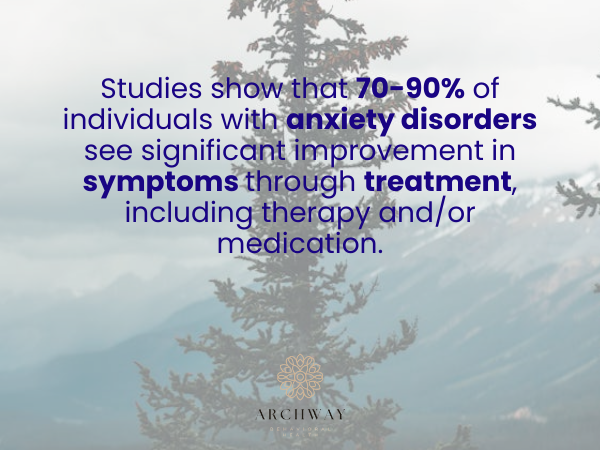Anxiety is a natural response to stress, but when it becomes overwhelming or persistent, it can disrupt daily life, relationships, and overall well-being. For individuals struggling with anxiety, finding effective strategies to regain control and live a balanced life is essential.
This blog explores the key approaches to managing anxiety and how professional treatment options, such as Individual Therapy, Group Therapy, Partial Hospitalization Programs (PHP), and Intensive Outpatient Programs (IOP), can provide the necessary support for a healthier mental state.
Understanding Anxiety: Causes and Impact
Anxiety is more than occasional worry or nervousness. It can manifest as an ongoing sense of unease, fear, or apprehension, often accompanied by physical symptoms like headaches, muscle tension, or fatigue. While the root causes of anxiety vary, common triggers include:
- Traumatic events
- Chronic stress
- Genetics or family history of anxiety
- Imbalances in brain chemistry
Without proper treatment, anxiety can lead to other mental health issues, such as depression, and impact physical health by increasing the risk of heart disease, gastrointestinal issues, and immune system dysfunction.
Living With Anxiety
Living with anxiety can feel like an ongoing battle with intrusive thoughts, physical discomfort, and emotional distress. For some, it may manifest as a constant undercurrent of worry, while for others, it can involve intense episodes of panic. Anxiety affects how individuals think, feel, and act, often interfering with their personal relationships, work productivity, and overall quality of life. However, it’s important to remember that living with anxiety doesn’t mean you have to face it alone. Through education, coping strategies, and professional support, individuals can regain control and improve their well-being.
Types of Anxiety Disorders
Anxiety disorders come in various forms, each with its unique symptoms and challenges:
- Generalized Anxiety Disorder (GAD): Characterized by excessive worry about everyday situations, often without a clear cause.
- Panic Disorder: Marked by sudden episodes of intense fear, often accompanied by physical symptoms such as chest pain, dizziness, or shortness of breath.
- Social Anxiety Disorder: Involves an intense fear of social situations, often driven by concerns about being judged or humiliated.
- Obsessive-Compulsive Disorder (OCD): Centers on recurring, unwanted thoughts (obsessions) and repetitive behaviors (compulsions) aimed at reducing anxiety.
- Post-Traumatic Stress Disorder (PTSD): Develops after experiencing or witnessing a traumatic event, leading to flashbacks, nightmares, and heightened anxiety.
- Phobias: Involve an intense, irrational fear of specific objects, situations, or activities (e.g., heights, flying, or spiders).
Causes of Anxiety
Anxiety often arises from a combination of biological, psychological, and environmental factors, including:
- Genetics: A family history of anxiety disorders can increase susceptibility.
- Brain Chemistry: Imbalances in neurotransmitters such as serotonin and dopamine can contribute to anxiety.
- Life Experiences: Traumatic events, prolonged stress, or significant life changes can act as triggers.
- Personality Factors: Individuals who are naturally more prone to worry or perfectionism may be at higher risk.
- Medical Conditions: Chronic illnesses, hormonal imbalances, or substance abuse can lead to anxiety symptoms.
Effective Strategies to Manage Anxiety
Managing anxiety requires a multi-faceted approach that blends self-care practices with therapeutic techniques.
1. Build a Structured Routine
Establishing and sticking to a daily schedule helps create a sense of predictability and control. Incorporating time for relaxation, exercise, and hobbies can reduce stress levels and improve mental clarity.
2. Practice Mindfulness and Relaxation Techniques
Mindfulness exercises, such as meditation, yoga, and progressive muscle relaxation, help calm the mind and improve emotional regulation. These techniques are particularly effective when integrated with therapies like Dialectical Behavior Therapy, which focuses on mindfulness and coping skills.
3. Challenge Negative Thought Patterns
Many individuals with anxiety experience automatic negative thoughts that exacerbate their symptoms. Cognitive Behavioral Therapy teaches techniques to identify, challenge, and replace these thoughts with healthier perspectives, reducing the intensity of anxious feelings over time.
4. Stay Physically Active
Regular physical activity reduces stress hormones and promotes the release of endorphins, the body’s natural mood boosters. Activities such as walking, jogging, or dancing can significantly alleviate symptoms of anxiety.
5. Build a Support Network
Connecting with others who understand your struggles can foster a sense of belonging and reduce feelings of isolation. Participating in Group Therapy sessions can provide a safe space to share experiences, gain insights, and receive encouragement from others facing similar challenges.
6. Learn Effective Time Management
Anxiety often intensifies when responsibilities pile up. Breaking tasks into smaller, manageable steps and prioritizing them can reduce the feeling of being overwhelmed.
7. Seek Professional Treatment
While self-help strategies are valuable, professional guidance is often necessary to address the root causes of anxiety and develop sustainable coping mechanisms. Structured programs such as PHPs and IOPs provide comprehensive support tailored to individual needs.
Natural Remedies for Anxiety
For those seeking holistic approaches to manage anxiety, several natural remedies can complement traditional treatments:
- Mindfulness and Meditation: Regular practice of mindfulness or guided meditation helps reduce stress and promote relaxation.
- Exercise: Physical activity releases endorphins and reduces cortisol, improving mood and reducing anxiety symptoms.
- Herbal Supplements: Natural remedies like chamomile, lavender, and ashwagandha have calming properties that may alleviate mild anxiety.
- Healthy Diet: A balanced diet rich in omega-3 fatty acids, whole grains, and fresh produce supports overall mental health.
- Sleep Hygiene: Creating a consistent sleep schedule and minimizing screen time before bed can help regulate the body’s natural stress response.
- Deep Breathing Exercises: Techniques like diaphragmatic breathing or 4-7-8 breathing can quickly lower anxiety levels in moments of stress.
Professional Treatment Options for Anxiety
Individual Therapy
Working one-on-one with a licensed therapist allows individuals to explore the specific causes of their anxiety and develop personalized coping strategies. Individual Therapy is often the foundation of an effective anxiety treatment plan, offering privacy and a tailored approach.
Group Therapy
Group Therapy sessions create a sense of community by bringing together individuals with shared experiences. These sessions focus on developing communication skills, emotional support, and strategies for managing anxiety in everyday life.
Partial Hospitalization Program (PHP)
A Partial Hospitalization Program is ideal for individuals needing intensive, structured care while maintaining the ability to return home in the evening. PHPs typically include a combination of therapies, such as CBT, DBT, and holistic approaches, to address anxiety comprehensively.
Intensive Outpatient Program (IOP)
An Intensive Outpatient Program offers flexibility for individuals who require treatment but have work, family, or school commitments. IOPs include evidence-based therapies like CBT and DBT, focusing on skill development, symptom management, and relapse prevention.
Anxiety Treatment Programs
Specialized Anxiety Treatment Programs aim to reduce symptoms, uncover triggers, and teach lifelong coping mechanisms. These programs often combine Individual Therapy, Group Therapy, and medication management when needed.
Depression Treatment Programs
Since anxiety and depression often coexist, addressing both conditions simultaneously is crucial. A comprehensive Depression Treatment Program integrates therapies to manage symptoms and improve overall well-being.
Evidence-Based Therapies for Anxiety
Professional treatment for anxiety often incorporates evidence-based therapies, such as:
- Cognitive Behavioral Therapy (CBT): Focuses on identifying and changing negative thought patterns that fuel anxiety.
- Dialectical Behavior Therapy (DBT): Combines mindfulness, emotional regulation, and distress tolerance techniques to manage intense emotions and reduce anxiety.
Both CBT and DBT are highly effective in equipping individuals with tools to regain control over their mental health.
Benefits of Structured Mental Health Programs
Engaging in structured mental health programs, such as PHPs or IOPs, offers several advantages:
- Comprehensive Support: A blend of individual and group therapy sessions ensures a holistic approach to recovery.
- Flexibility: Programs like IOP allow individuals to maintain their daily routines while receiving necessary treatment.
- Accountability: Regular check-ins with therapists and peers help individuals stay on track with their recovery goals.
- Skill Building: Participants learn practical strategies for managing anxiety, preventing relapses, and building healthier habits.
Get Professional Help and Support for Anxiety
When anxiety becomes unmanageable, seeking professional help is crucial. Structured programs, such as a Partial Hospitalization Program or an Intensive Outpatient Program, provide the comprehensive care needed to address anxiety effectively. Evidence-based therapies like Cognitive Behavioral Therapy and Dialectical Behavior Therapy are highly effective in teaching individuals how to manage symptoms and regain control of their lives.
Professional support also includes Individual Therapy and Group Therapy, which provide safe spaces to explore personal challenges and develop practical strategies for coping. Whether you’re seeking a specialized Anxiety Treatment Program or broader mental health care, professional guidance can make a transformative difference.
Conclusion
Anxiety is a common but treatable condition. Whether you’re living with generalized anxiety, panic attacks, or social fears, there are effective strategies and resources available to help you regain a sense of calm and balance. By incorporating natural remedies, building strong support systems, and engaging in professional treatment programs, you can take meaningful steps toward managing anxiety and improving your overall quality of life.
Managing anxiety is not a one-size-fits-all journey. It requires a combination of personalized strategies, professional support, and a commitment to self-care. Whether you’re seeking relief through mindfulness practices, evidence-based therapies like CBT and DBT, or structured programs like PHPs and IOPs, there is hope for achieving a more balanced, fulfilling life. Take the step toward reclaiming your life and health—contact us at (888) 488-4103.
FAQ on Anxiety Disorders
What are the common symptoms of anxiety?
Common symptoms of anxiety include excessive worry, restlessness, irritability, difficulty concentrating, fatigue, muscle tension, and physical symptoms such as headaches or rapid heartbeat.
What types of anxiety disorders exist?
Types of anxiety disorders include Generalized Anxiety Disorder (GAD), Panic Disorder, Social Anxiety Disorder, Post-Traumatic Stress Disorder (PTSD), Obsessive-Compulsive Disorder (OCD), and specific phobias.
What are the causes of anxiety?
Anxiety can be caused by genetic factors, brain chemistry imbalances, traumatic life events, chronic stress, or medical conditions.
Are there natural remedies for anxiety?
Yes, natural remedies like mindfulness meditation, regular exercise, herbal supplements (e.g., chamomile and lavender), healthy diets, and deep breathing exercises can help manage anxiety symptoms.
When should I seek professional help for anxiety?
Seek professional help if anxiety begins interfering with daily life, relationships, or work. Professional options like Individual Therapy, Group Therapy, PHP, IOP, and specialized Anxiety Treatment Programs provide structured support and evidence-based therapies.
What therapies are most effective for treating anxiety?
Cognitive Behavioral Therapy (CBT) and Dialectical Behavior Therapy (DBT) are highly effective evidence-based approaches for managing and treating anxiety.



